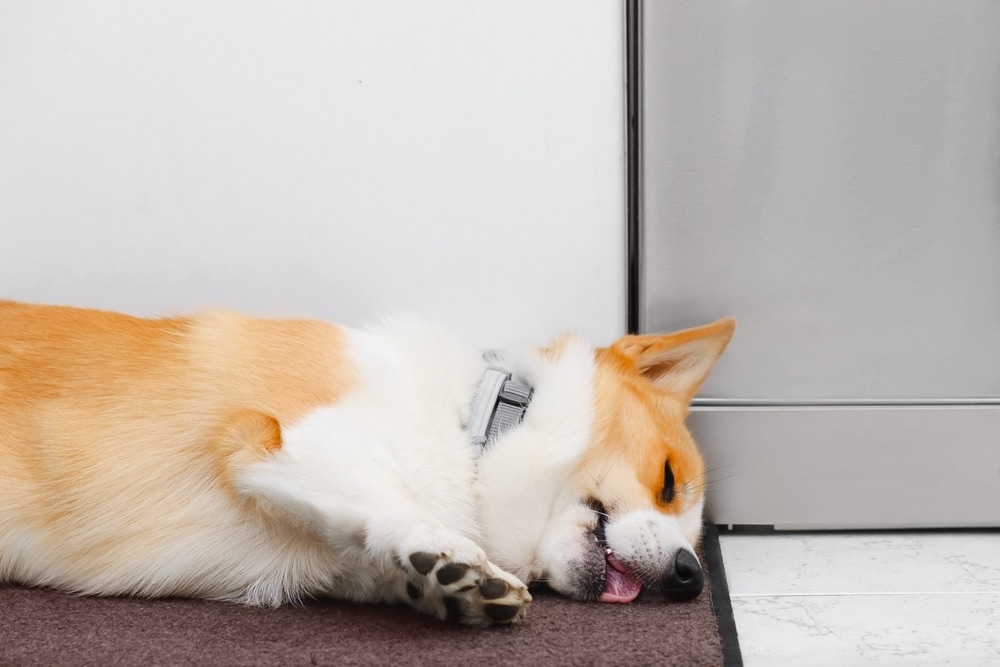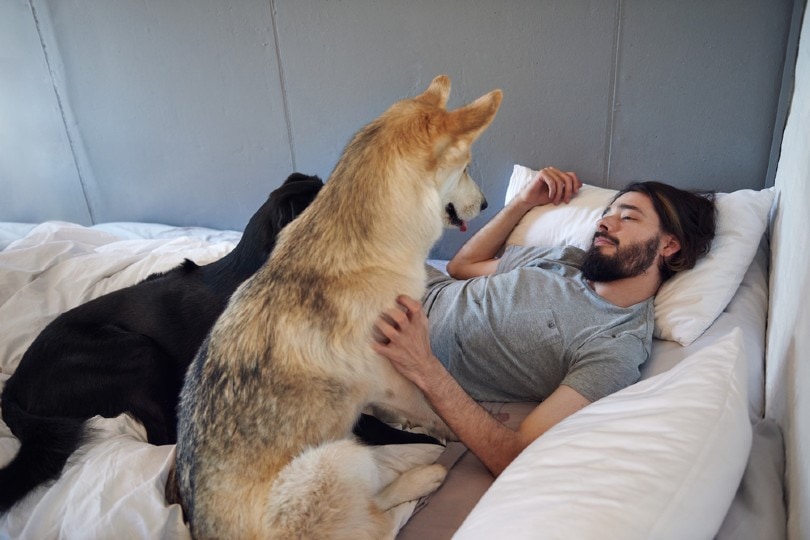In this article
Most dogs sleep throughout the night as well as for much of the day. As humans, we’re used to sleeping only at night when it’s dark outside and staying up all day. Dogs, like us, have a diurnal rhythm, but they tend to sleep also for small periods throughout the day. It may seem like they’re sleeping a lot since many healthy adult dogs sleep around 12 to 14 hours in a day.
So, when is it time to worry? Like other predators, dogs have short sleep-and-wake cycles. The amount of hours they sleep may vary depending on factors such as their age and health. However, sleeping excessively can frequently indicate a health problem that should warrant veterinary attention.
Learn more about a dog’s normal sleep patterns and how to tell if something is wrong.

Why Dogs Sleep So Much
Many mammals sleep for most of the day, on and off. Dogs aren’t much different. They don’t have homework or chores or smartphones to occupy them, so they sleep when things are calm. Conversely, dogs also wake up and are fully alert in mere seconds.
- Age: Puppies and senior dogs will sleep more than middle-aged dogs
- Health: Sick dogs or those recovering from illness will sleep more than healthy dogs
If your dog seems to sleep more than usual or struggles to wake up, it could be a sign of a problem. Some age-related problems and illnesses can manifest with lethargy, such as infectious diseases, neurological problems, canine cognitive dysfunction (doggy dementia), and pain.
Generally, a dog that sleeps for around 12 hours a day isn’t a cause for concern. Pay attention to your dog’s sleep cycles and other behaviors, such as appetite, activity level, and alertness, before worrying about an underlying condition.

Give Your Pup Something to Do
While we work or go to school, dogs are alone all day. Then, we go to bed at night, and again our dogs are alone with nothing to do. If you think your dog sleeps too much and you have ruled out any health issues with your vet, it may be that it doesn’t have much else to do.
If you want to stave off boredom and give your dog more enrichment during the day, try interventions like puzzle toys. These toys use challenges like hiding a treat and making your dog find it under a cup or inside of a ball. Toys can be simple or complex, so you can start with an easier option and upgrade to a harder one.
You can also give your dog a midday walk if you can take the time from work during your lunch break. If not, hire a dog walker to give your dog a brisk afternoon walk. Or you may want to take your dog in the morning or evening when you’re home to give them some exercise and bonding time.

When to Seek Veterinary Attention
In most cases, you’ll notice an increase in sleeping with other signs, such as inappetence, lameness, digestive issues, or obvious pain. Still, dogs can be good at hiding their issues, so excessive sleep may be the first indicator that something is wrong.
- Changes in sleep patterns
- Sleeping when you offer alternatives, like play or food
- Refusing to play or go for a walk
- Less eating or drinking
- Pickier appetite
- Difficulty waking up
- Narcolepsy, or falling asleep randomly
- Waking suddenly, looking scared or upset
- Weakness, lameness, or limping
- Struggling to get up
- An increase in aggression
- Pacing or drooling
- Vocalizing
Some of these signs may indicate age-related problems, such as arthritis or canine cognitive dysfunction, while others may indicate other health problems like gastroenteritis, infections, or hypothyroidism, to mention some. Have your vet examine your dog to determine the underlying cause.
If you need to speak with a vet but can't get to one, head over to PangoVet. It's our online service where you can talk to a vet online and get the advice you need for your dog — all at an affordable price!


Why Does My Dog Sleep So Much?
Dogs sleep a lot; however, any change in your dog’s sleeping pattern should make you contact your vet and have them thoroughly checked. You can give your dog enrichment through walks, playtime, or puzzle toys if you want to keep them busy during daytime. If you still notice your dog is sleeping a lot and showing other signs of illness like inappetence or weakness, it’s time to see a vet.
- See also: Senior Dogs: Diet & Nutritional Needs
Featured Image: Quisquilia, Shutterstock























